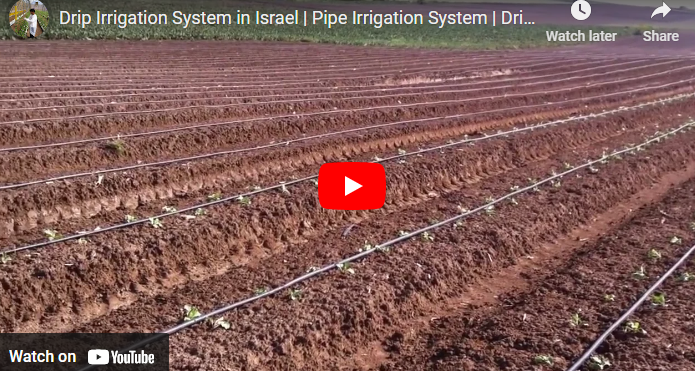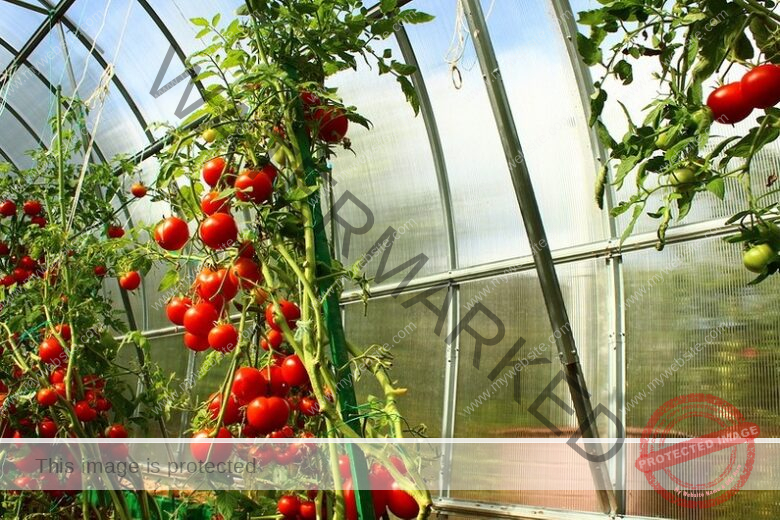Israel is a country known for its agricultural prowess, despite the fact that it is mostly arid and prone to drought. One of the keys to Israel’s agricultural success is its use of innovative irrigation systems, particularly drip irrigation.
Drip irrigation systems are well-suited for the country’s climate, allowing farmers to conserve water and irrigate crops more efficiently.
Israeli farmers and companies have played a significant role in the development and improvement of drip irrigation technology, and today Israel is one of the world’s leading exporters of drip irrigation systems.
Therefore, this article will focus on drip irrigation systems in Israel and their unique features.
Drip Irrigation System In Israel
There are several types of drip irrigation systems used in Israel, each with its unique features and benefits.
Let’s explore some of the most common types and how they function:
Read Also: Drip Irrigation System in Greenhouse
#1. Inline Drip Irrigation
This system delivers water through small, pre-installed drippers located at regular intervals along the tubing.
This system is ideal for row crops, such as corn and soybeans, and can reduce water usage by up to 50%.
The tubing is typically buried underground or placed on the surface, depending on the crop and soil type.
The inline drip system allows for precise placement of water and is best suited for rows of crops that are spaced relatively far apart.
Read Also: Drip Irrigation System In Africa
#2. Subsurface Drip Irrigation
As the name suggests, this system delivers water directly to the root zone of plants, below the soil surface. This system is ideal for crops that have deep root systems, such as fruit trees and vines.
Subsurface drip irrigation can also be used in saline soils, where surface drip irrigation can result in salt buildup.
The tubing is installed underground, either just below the soil surface or deeper, depending on the crop and soil type.
Subsurface drip irrigation minimizes water loss due to evaporation and reduces the risk of weed growth, making it an ideal option for vegetable and fruit crops.
#3. Point-Source Drip Irrigation
This system delivers water directly to the plant’s root zone through individual drippers or emitters.
This system is ideal for crops that require high precision irrigation, such as greenhouse crops and orchards.
Read Also: List of Irrigation Schemes In Ghana
The drippers are placed at or near the base of the plant, and the tubing is typically above ground.
Point-source drip irrigation allows for precise water delivery, making it ideal for small gardens or orchards where water needs may vary by plant.
#4. Micro-Sprinkler Drip Irrigation
This system delivers water in the form of a fine mist or spray, similar to a traditional sprinkler system.
The tubing is typically installed above ground and is equipped with micro-sprinklers or misters that deliver water in a circular pattern.
Micro-sprinkler drip irrigation is best suited for crops that require more water than traditional drip systems, such as tree crops or vineyards.
Read Also: Drip Irrigation System Ghana [Installation Guide ]
#5. Surface Drip Irrigation
This is the most commonly used type of drip irrigation in Israel. In surface drip irrigation, water is applied to the soil surface through emitters placed along the length of the drip lines.
This system is ideal for crops that have shallow root systems, such as vegetables, and can be used on any type of soil.
Best Practices of using Drip Irrigation System in Israel
#1. Proper System Design
The success of drip irrigation depends on the proper design of the system. The system design should take into account factors such as soil type, crop type, and water quality. A well-designed system will ensure uniform water distribution, improve crop yield, and reduce water waste.
#2. Regular Maintenance
Regular maintenance of the drip irrigation system is critical to ensure its proper functioning. The system should be checked regularly for clogged emitters, damaged pipes, and leaks. The filters and screens should be cleaned regularly to prevent clogging.
#3. Proper Scheduling
Proper scheduling of irrigation is important to ensure that the crops receive the required amount of water. The irrigation schedule should take into account factors such as crop stage, soil moisture, and weather conditions.
#4. Fertilizer Application
Drip irrigation systems in Israel can be designed to deliver fertilizers along with water to the root zone of the crops. This allows for more efficient use of fertilizer and reduces the risk of leaching.
Measures to Maintain Drip Irrigation System in Israel
#1. Filter Maintenance
Filters are essential components of the drip irrigation system, and they should be checked and cleaned regularly to prevent clogging.
#2. Pressure Regulation
Maintaining proper water pressure is essential for the efficient functioning of the drip irrigation system. Pressure regulators should be installed and checked regularly to ensure that the system is operating at the correct pressure.
#3. Leak Detection
Leaks in the drip irrigation system can lead to significant water waste and reduced crop yield. Regular inspections and leak detection should be performed to ensure that the system is leak-free.
#4. System Flushing
Flushing the system at regular intervals helps remove debris and sediment that may clog the emitters and filters. It also helps to maintain water quality and prevent the buildup of harmful chemicals.
Tips to Select the Right Irrigation System in Israel
- Water availability: The availability of water in Israel can be limited in some areas. Therefore, it is important to select an irrigation system that is efficient in its use of water.
- Soil type: The type of soil can impact the type of irrigation system that is best suited for a particular area. For example, sandy soils require irrigation systems that can deliver water slowly to avoid runoff.
- Crop type: Crop types vary in their water requirements, as each crop has unique demands for water consumption. The irrigation system should be selected based on the crop type and the amount of water it requires.
- Budget: The cost of the irrigation system should be taken into consideration when selecting the right system. Drip irrigation systems are generally more expensive than other types of irrigation systems, but they are also more efficient.
Advantages of Drip Irrigation System in Israel
- Efficient water use: Drip irrigation systems are designed to deliver water directly to the root zone of the plants, reducing water waste and increasing water use efficiency.
- Improved crop yield: Drip irrigation systems can improve crop yield by providing a consistent and precise amount of water to the crops.
- Reduced weed growth: Drip irrigation systems deliver water only to the plants, reducing the amount of water available for weed growth.
- Reduced fertilizer use: Drip irrigation systems can be designed to deliver fertilizers directly to the root zone of the plants, reducing the amount of fertilizer required and the risk of leaching.
Disadvantages of Drip Irrigation System in Israel
- High initial cost: Drip irrigation systems can be more expensive to install than other types of irrigation systems.
- Clogging: Drip irrigation systems are prone to clogging due to the small size of the emitters and the narrow diameter of the pipes.
- Maintenance: Drip irrigation systems require regular maintenance to ensure their proper functioning.
- Vulnerability to damage: Drip irrigation systems can be damaged by rodents, insects, and other animals.
Costs of Drip Irrigation System in Israel
The cost of drip irrigation systems in Israel can vary depending on factors such as the size of the farm, the type of crop, and the complexity of the system.
However, in general, drip irrigation systems are more expensive than other types of irrigation systems due to the cost of the materials and installation.
The cost of a drip irrigation system in Israel can range from a few hundred to several thousand shekels per dunam (1 dunam is approximately 0.25 acres).
However, despite the high initial cost, drip irrigation systems can provide significant long-term benefits in terms of water conservation and crop yield.
Israel Drip Irrigation System Case Study
Israel is a global leader in drip irrigation technology. Due to its arid climate and limited water resources, Israel has been at the forefront of developing innovative irrigation technologies that conserve water and increase crop yields.
The country has implemented drip irrigation systems extensively across its agricultural sector and has seen significant improvements in water use efficiency and crop yields.
Israel Drip Irrigation Companies
There are several drip irrigation companies based in Israel that are at the forefront of developing innovative irrigation technologies.
Some of the prominent drip irrigation companies in Israel include Netafim, Rivulis, Metzer, and Dorot.
Israel Irrigation System PDF
The Israeli government has implemented several initiatives to promote the use of efficient irrigation systems, including drip irrigation.
The Ministry of Agriculture and Rural Development has published several PDF documents providing guidelines and information on drip irrigation systems, including installation, maintenance, and operation.
Crops Grown in Israel on Drip Irrigated Land
A wide variety of crops are grown in Israel using drip irrigation systems, including fruits, vegetables, field crops, and flowers.
Some of the major crops grown on drip irrigated land in Israel include citrus, avocados, grapes, olives, tomatoes, cucumbers, peppers, and melons.
Who Invented Drip Irrigation System
The modern drip irrigation system was invented by Israeli engineer Simcha Blass in the early 1960s.
Blass developed the concept of delivering water directly to the root zone of the plants through a network of pipes and emitters.
His invention revolutionized irrigation practices and helped to conserve water and increase crop yields in arid regions.
Modern Drip Irrigation Systems
Modern drip irrigation systems have evolved significantly since the invention of the system by Simcha Blass.
Today’s drip irrigation systems are more efficient, durable, and adaptable to different crop types and soil conditions.
They use sophisticated sensors and control systems to deliver water precisely to the plant roots and to manage soil moisture levels.
Israel Agriculture Irrigation System
The agriculture sector in Israel is heavily dependent on irrigation due to the country’s arid climate.
The Israeli government has implemented several initiatives to promote the use of efficient irrigation systems, including drip irrigation.
Drip irrigation has been widely adopted in Israel’s agricultural sector and has led to significant improvements in water use efficiency and crop yields.
History of Drip Irrigation
The history of drip irrigation dates back to ancient times when farmers in arid regions used clay pots to deliver water to the roots of the plants.
However, the modern drip irrigation system was invented in Israel in the 1960s by Simcha Blass.
Since then, drip irrigation has become a widely adopted irrigation system worldwide, helping farmers to conserve water and increase crop yields.
Conclusion
Drip irrigation has had a significant impact on agriculture in Israel, allowing farmers to grow crops more efficiently and sustainably in an arid climate. With ongoing innovation and advancements in technology, drip irrigation will likely continue to play a vital role in Israel’s agricultural success and in ensuring food security for the country and beyond.




